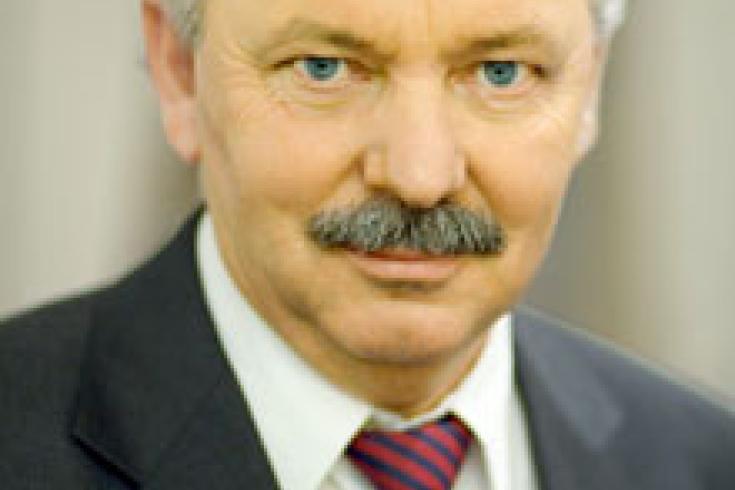Generate political energy!
Interview with CTBTO Chairman Ambassador Hans Lundborg
Ambassador Hans Lundborg is Ambassador of Sweden to Austria and Permanent Representative to the United Nations in Vienna. He was Chairman of the CTBTO's main policy making organ, the Preparatory Commission, in 2008.
Could you describe, in a nutshell, your experience as chairman of the Preparatory Commission for the Comprehensive Nuclear-Test-Ban Treaty Organization (CTBTO)? Where do you see the priorities for the coming year? My experience is good cooperation, good reports from the two working groups and from the advisory committee, while the focus in the PrepCom (i.e. the executive body of the CTBTO, ed. remarks) was more on politicized issues. The most difficult question for me during the PrepCom was actually not really related to the Treaty and its entry into force, but rather the request from Palestine for observer status with the Commission. I hope that this year the new political momentum will help us to get more countries to ratify the Treaty. I think one of the most important questions we have this year is the Article XIV Conference to promote the entry into force of the Treaty in New York in September. An extremely crucial question is also how the new U.S. administration will deal with the issue of CTBT ratification. I have received some very positive signals from Washington, and I know there is a willingness to come closer to look into the question. I think if we can get the PrepCom to focus more on such issues, and how to mobilize political energy into the work of the PrepCom, it would be very positive.
You have referred to a new political momentum behind the Comprehensive Nuclear-Test-Ban Treaty (CTBT) and described the support of U.S. president-elect Obama as “extremely crucial”… We have a number of States that have to ratify the Treaty. President-elect Obama stated very clearly in his campaign that he wanted to take a step further towards ratification of the CTBT. That’s a fact that was confirmed to me through my Washington contacts. We don’t know how quickly it can be done, but if we have the United States ratifying, I strongly believe that China will follow suit, and after China a number of other States. The most difficult ones will of course be India, Pakistan and Egypt. But hopefully we will have positive reactions from the other countries – although that’s wishful thinking now – within a period of two to three years.
What advice would you give to other countries that are, like Sweden, eager to promote the entry into force of the CTBT?
What other countries can do is to argue actively for ratification. We have to create a kind of political momentum and put political energy into the question. The only way to generate political energy is through political leaders who are convinced that this Treaty must come into force and who will argue for it. That’s also something we will look into in our upcoming presidency of the European Union. For the Swedish government and our Minister for Foreign Affairs, Carl Bildt, one of the top priorities when it comes to disarmament and non-proliferation is actually to secure the CTBT’s entry into force. So I think if we can get other ministers and heads of governments to put pressure on those nine countries, and with U.S. ratification in sight, we will be able to build up further political momentum.
How do you interpret the fact that the latest session of the CTBTO PrepCom in November 2008 concluded in only two days, which was half of the time foreseen? It was definitively a positive sign. The PrepCom in November the previous year lasted an entire four days, which were spent to a large extent on discussions related to the Palestine observer status issue. Under my chairmanship I was keen to avoid this type of open controversial debate, which might create the dangerous misperception that the CTBTO PrepCom aspires to be a political forum discussing the Middle East conflict. I therefore held very extensive informal consultations on the Palestine issue with a number of Member States and regional groups, with the G77, the NAM group, with Israel, with Palestine, etc. No conclusion could be reached, but I will continue to do my best and carry on my consultations now after the holidays to find a way forward. Of course, the present situation in the Middle East is not very favourable.
On a less political topic, how do you see the status of the build-up of the CTBT’s verification regime and its budgetary implementations? First, I’d like to point to the ongoing International Scientific Studies project, which will provide an independent assessment on how the verification technologies have improved since the Treaty was adopted in 1996. We now have 235 certified stations sending data, but the 86 left - those we should invest in - are the more difficult ones, geographically and perhaps also politically. Preparing the organization for entry into force, which could come within a period of two to three years, by completing IMS [International Monitoring System] build-up, will entail a certain amount of costs. We have to convince the Member States that we need these resources in order to build up our station network in full. The budget discussions in the November PrepCom were extremely difficult.
Is zero-real growth then a realistic expectation for the coming years? No, I don’t think so. My personal view is – and I’ve been working on United Nations’ questions now for 25 years – of course that we should have a very restricted budget and be as cost-efficient as possible. But there are limits to this. If we put a demand on an organization to expand and do new things, we should also be ready to bear the responsibility to cover the costs. And I think here, as the Treaty is approaching entry into force, we must have a good verification mechanism. This costs money. But we’re not talking about vast amounts. It’s very specific and limited resources to be spread out among all 180 Member States.

CTBTO PrepCom Chairman and Ambassador Hans Lundborg: Positive signals from Washington.
14 Jan 2009
